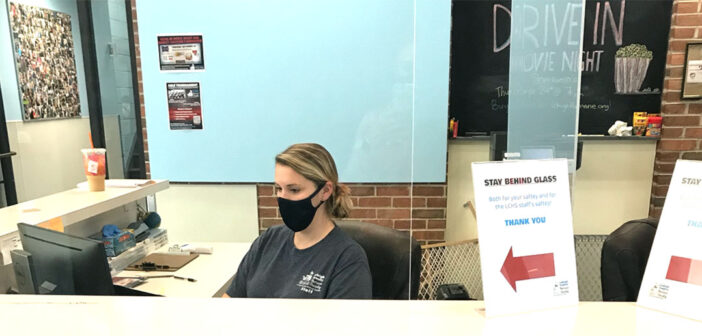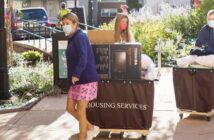Bucks County SPCA, Lehigh County Humane Society and Logan’s Heroes — all animal shelters in and around the Lehigh Valley — have had an unusual year in terms of animal intakes and adoptions and continue to face financial uncertainty amid the pandemic.
Bucks County SPCA in New Hope, Pennsylvania, and Lehigh County Humane Society in Allentown provide lost and found, adoption, and cruelty investigation services. Logan’s Heroes, in East Greenville, Pennsylvania, is a foster-based rescue organization providing adoption services and animal foster programs.
Bucks County SPCA
The Society for the Prevention of Cruelty to Animals saw a large increase in adoptions at the beginning of the coronavirus lockdown in March followed by a second spike in animal adoptions and intakes in August.
Linda Reider, executive director of the Bucks County SPCA, believes the increase in adoptions at the beginning of the quarantine occured because they stayed open while many other shelters in the area did not, due to COVID-19 policies and guidelines.
Reider said the organization moved to appointment-only, limiting the process to one visitor at a time to bring in an animal, look for an animal for adoption, buy a dog license or reclaim a lost pet.
“We had to make sure that we weren’t overloading the space, (so) because of that, it slowed things down,” she said.
Additionally, they have been asking all intakes whether the animal may have been exposed to COVID-19 and quarantining them if necessary to protect the animals, caretakers and visitors. They followed this protocol when treating two dogs from a cruelty case who were thought to have been exposed to COVID-19.
“We kept them in a separate housing area, and we used PPE when we cared for them and had a specific staff member provide them with care for a quarantine period,” Reider said. “When the staff member didn’t get sick, then we were able to end that, and everyone was fine. We now ask every time, ‘Do you think this animal may have been exposed to COVID in the home?’ so we can follow what is set up as a careful quarantine.”
Reider noticed while more kittens were being born due to a lack of neutering and spaying this year, their intake for kittens did not change much. Neutering and spaying were considered elective surgeries for three months, starting in mid-March.
Many states placed restrictions on elective surgeries in the beginning of the pandemic.
“Cats can live very successfully outside and have three litters a year, and there’s a huge population of cats that are not spayed and neutered having kittens all the time,” Reider said. “So, we guessed people were stuck at home and they would find litters of kittens, and, instead of bringing them to us, we think many people raised them themselves.”
Reider believes halting the spay and neuter processes in conjunction with the closing of the courts backed up their shelter and other shelters around the United States.
The closing of courts lasted from April to August. Because courts were closed, there still are a lot of animals in the SPCA that are not yet eligible to be adopted.
“In July, we took 62 animals from one place, and that court case has still not happened,” Reider said. “None of those animals could get hearings for four months, and they are all still with us. Even after you win your case, you have to wait for 30 more days to give the person a chance to appeal if they were found guilty … then after 30 days, if they don’t appeal and they lost, which is typically what happens, then we get ownership of (the animals) and can move them through our system into adoption.”
During the lockdowns, animal return rate hit a low of three percent, compared to five percent previously. Reider believes this is because owners have more time than ever before to spend with their pets at home, and, with the release of their new behavior help line for their Bucks County pet owners, getting resolutions to any issues that arise is easier than before.
August’s adoption and intake statistics leave hope for the future at the Bucks County SPCA. The chapter had 143 adoptions in August, Reider said.
“Incoming was up, but animals going out was up even more significantly,” she said. “We feel like we are returning to some sort of normal.”
The SPCA’s biggest concern right now is its finances, because the organization is donation-funded. They typically raise money through the sale of dog licenses, animal adoptions or donations at their front counter or online. With fewer patrons, however, they have not been able to raise as much money as usual.
Reider said they can’t hold their fundraising events because of COVID-19.
“We depend on a big fundraising party in October, and we can’t have it this year because we can’t get that many people into a room,” Reider said. “So, we are having what’s called a ‘pajama gala.’ We need to have enough money to take care of the animals, even though we can’t have a big party to help support that.”
Lehigh County Humane Society
At the Lehigh County Humane Society, adoptions and interest in fostering are higher than ever.
The Lehigh County Humane Society limited people in the facility at any one time to a maximum of 10: four people are allowed in their large dog kennels, and two people can play with a dog at a time. They also have installed plexiglass at all checkouts.
Unlike the SPCA, it is not evident that these procedures are slowing down adoption or intakes in any way.
Jackie Folsom, development coordinator at Lehigh County Humane Society, said they often had to close down their application portal at the beginning of quarantine when they only had one adoption counselor due to an unexpectedly high influx of adoption applications.
She said intakes have remained the same as usual.
“People are more interested in adopting than ever,” Folsom said. “They have a lot of free time, and working from home or being in isolation may cause them to be a bit lonely. We’ve had through-the-roof demand for adoption throughout this whole thing.”
Folsom said, on top of quarantine-induced free time and loneliness, the increase in adoptions is also due to a streamlined adoption process they implemented this year. Instead of being approved for adoption after choosing an animal, potential adopters must now apply to adopt before being able to choose.
Regarding kitten season, Folsom said there has not been much of an increase in intake, but there has been a large increase in desire for fostering them.
“We’ve had a good amount of kittens, a litter a day,” Folsom said. “It hasn’t been out of control. We’ve had a lot of interest in fostering kittens, maybe people who are finding them feel like they have the time and attention to raise them themselves, which is wonderful for us and for the kittens.”
The Lehigh County Humane society is still able to partner online with companies for their fundraisers, as they have before COVID-19. Currently, they are hosting their “Snoot Candles Fundraiser” where proceeds collected from selling candles will go to the shelter.
Logan’s Heroes
Logan’s Heroes also experienced large increases in adoptions, fosters and intakes since quarantine started. Because it’s foster-based, Logan’s Heroes is not reliant on keeping animals in a facility, so COVID-19 procedures were not implemented.
“We’ve already adopted out more dogs this year than we had last year in total,” said Chris Baringer, president of Logan’s Heroes. “We had an increase in the amount of fosters. We are all foster-based for dogs and cats, so that’s where people being home is actually a plus, because we had more opportunities for fosters and we were able to help more animals that way.”
Additionally, intake for their main animals, cats and dogs, has increased dramatically.
“Our whole total dog intake this year has been 260 dogs so far, and it’s only September,” Baringer said. “That’s about what we did for last year with dogs. We have over 100 cats and kittens, and last year we did 60. We’ve seen quite an increase compared to what we’ve seen before.”
Baringer said “No Nonsense Neutering,” a spay and neutering service in the area, has a big presence in Allentown. It opened up around two months ago, but closed shortly thereafter for three months because of coronavirus restrictions — right in the middle of kitten season — which could be contributing to the increase in cats.
One challenge at Logan’s Heroes has been the dramatic increase in people interested in adopting puppies.
“Instead of getting five or 10 applications (per puppy), we were getting hundreds … our big concern is if that puppy, even when things go back to normal, is still going to be there,” Baringer said. “We’ve had a lot of people that normally travel a lot but are staying home because of this quarantine who are interested. Well, you need to stay home and make arrangements for the next 10 to 15 years. This is a 10 to 15 year commitment.”
Baringer is concerned adopters are thinking in the short-term rather than the long-term, and he is afraid of receiving returns when people don’t have time for their pets anymore.
Another concern of Baringer’s are Logan’s Heroes’ finances this year. Baringer said an increase in their adoptions means an increase in expenses. The average cost to bring a dog into their rescue system is $600, but they adopt them out for free.
“The only problem that we’re facing is the increase in vet bills, of course, with the increase of adoptions, but the decrease in fundraisers,” Baringer said. “We lost five major fundraisers in the spring, and spring starts our season for raising funds for the whole year to help care for all of the medical needs and (food) for the animals that we bring into our rescue. We lost over $30,000 of fundraising revenue this year because of coronavirus.”
“Mutts and Munchies” is the big fundraiser Logan’s Heroes hosts in the fall, which is now going to happen outside with attendees and vendors spaced out and wearing masks in accordance with COVID-19 guidelines.






Comment policy
Comments posted to The Brown and White website are reviewed by a moderator before being approved. Incendiary speech or harassing language, including comments targeted at individuals, may be deemed unacceptable and not published. Spam and other soliciting will also be declined.
The Brown and White also reserves the right to not publish entirely anonymous comments.
1 Comment
A great piece of information. I think this is what I was exactly looking for. All tips in a single click. I would definitely try to follow these suggestions.Without taken much of your time, in addition to this topic let me quickly tell you what credit card use is for. this is a card for people that like to make this type of fashion statements.